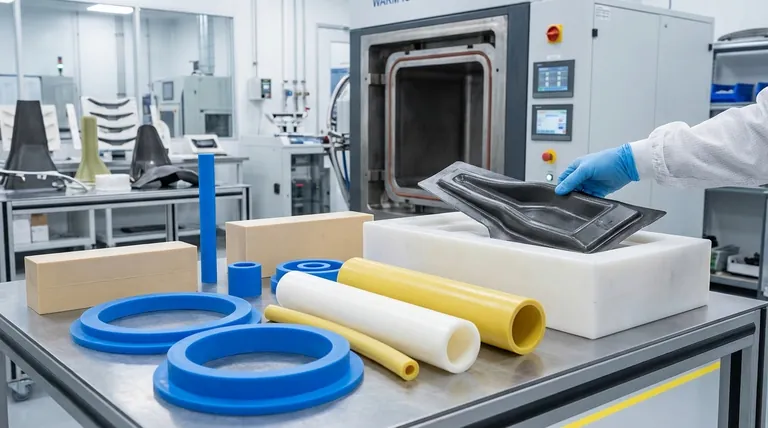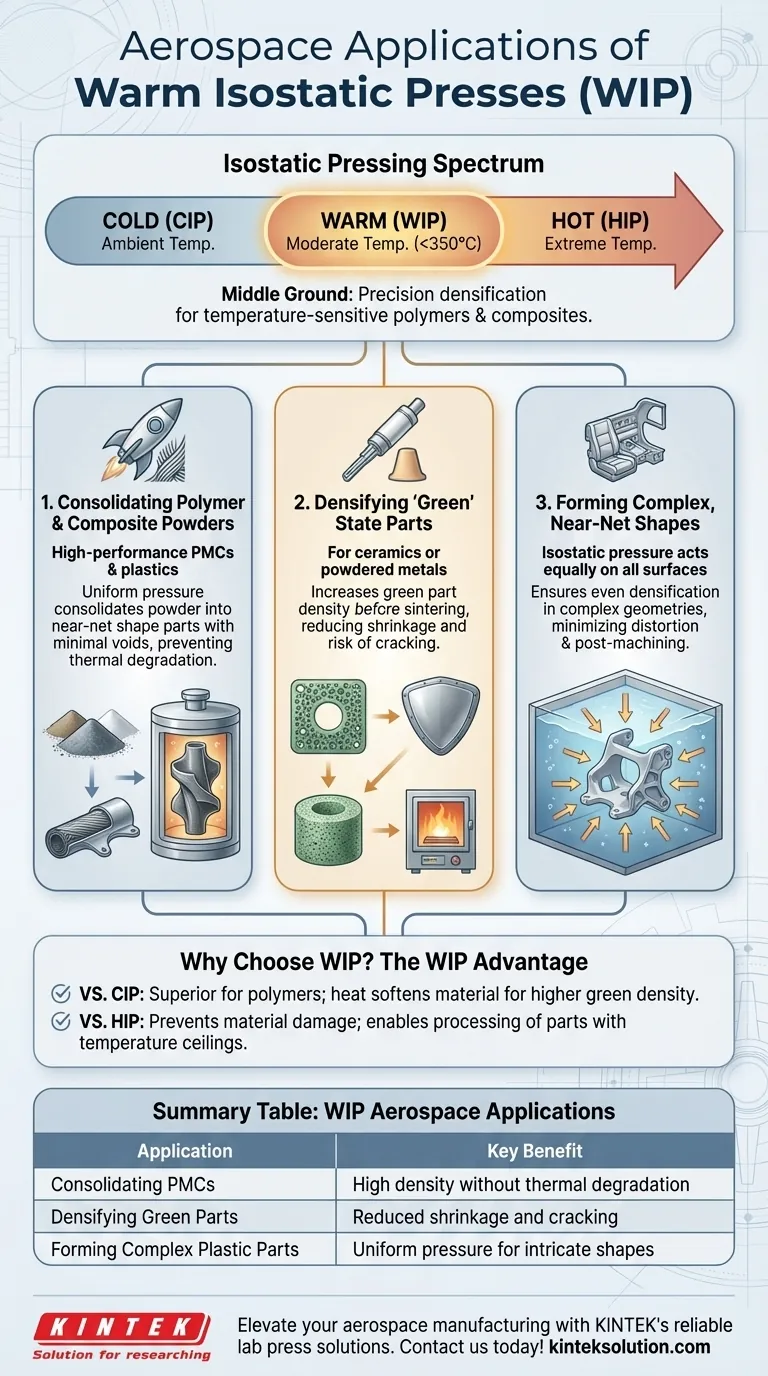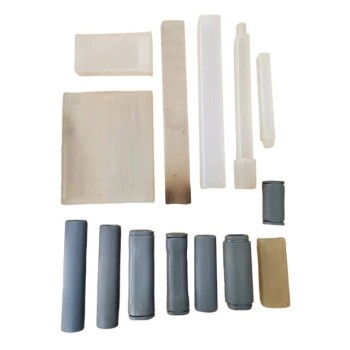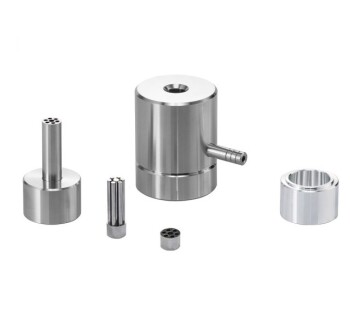In aerospace manufacturing, Warm Isostatic Pressing (WIP) is a specialized process used to form critical components from temperature-sensitive advanced materials. Specific applications include the consolidation of polymer matrix composite (PMC) powders into near-net shape structural parts, the densification of "green" (unsintered) ceramic components for sensors and heat shields, and the forming of complex plastic parts used in cabin or fuselage assemblies.
The central value of Warm Isostatic Pressing lies in its ability to achieve high, uniform density in materials that cannot withstand the extreme temperatures of Hot Isostatic Pressing (HIP). It occupies a critical middle ground, offering precision densification for temperature-sensitive polymers, composites, and pre-sintered parts.

Why Aerospace Relies on WIP for Critical Components
The aerospace industry demands components that are simultaneously lightweight, exceptionally strong, and free from internal defects. WIP technology directly addresses this challenge for a specific class of advanced materials.
Consolidating Advanced Polymer and Composite Powders
Many modern aerospace structures rely on Polymer Matrix Composites (PMCs) and high-performance plastics. These materials offer excellent strength-to-weight ratios but can degrade or melt at high temperatures.
WIP uses a heated liquid medium to apply uniform pressure at moderate temperatures (typically below 350°C). This process consolidates the polymer or composite powders into a solid, near-net shape part with minimal internal voids, a task impossible with high-temperature methods like HIP.
Densifying "Green" State Parts Before Sintering
For components made from ceramics or powdered metals, the initial "green" part formed from powder is often porous.
WIP is applied at this intermediate stage. The combination of uniform pressure and moderate heat significantly increases the density of the green part before final sintering. This leads to less shrinkage and a lower risk of cracking during the final high-temperature firing process.
Manufacturing Complex, Near-Net Shapes
Aerospace components are rarely simple blocks; they are often intricate shapes designed to save weight and fit into complex assemblies.
The uniform pressure distribution of WIP is a key advantage here. Unlike uniaxial pressing, the isostatic pressure acts equally on all surfaces of the component, ensuring even densification even in parts with complex geometries, undercuts, and varying thicknesses. This minimizes distortion and reduces the need for costly post-machining.
Understanding the Trade-offs: WIP vs. CIP and HIP
To truly understand WIP's role, you must see it in context with its counterparts: Cold Isostatic Pressing (CIP) and Hot Isostatic Pressing (HIP).
When to Choose WIP Over Cold Isostatic Pressing (CIP)
CIP applies uniform pressure at ambient temperature. While simpler and cheaper, it is less effective for materials that benefit from thermal softening.
WIP is superior when processing polymers or powder mixtures with binders. The elevated temperature softens the material, allowing particles to deform and pack more efficiently, resulting in a higher "green density" and stronger final part than CIP can achieve.
When to Choose WIP Over Hot Isostatic Pressing (HIP)
HIP operates at extreme pressures and temperatures, sufficient to achieve full theoretical density in metals and ceramics. However, this process is too aggressive for many materials.
WIP is the necessary choice when your material—such as a polymer, a plastic, or a composite—has a processing temperature ceiling. It provides the benefits of isostatic pressure without thermally damaging the material's fundamental structure.
Making the Right Choice for Your Goal
Selecting the correct isostatic pressing method is critical to achieving your desired material properties and component quality.
- If your primary focus is consolidating polymer powders or PMCs: WIP is the definitive choice, as its moderate temperature prevents material degradation while ensuring high density.
- If your primary focus is improving pre-sintering density in ceramics: WIP is an excellent process step to create more uniform green parts, reducing defects in the final sintered component.
- If your primary focus is achieving maximum theoretical density in a metal alloy: HIP is the correct tool, as it provides the extreme heat and pressure required for full metallurgical bonding.
- If your primary focus is simply compacting a robust powder at low cost: CIP may be sufficient for your application, provided you do not need the density benefits of thermal assistance.
Ultimately, Warm Isostatic Pressing empowers engineers to create highly uniform, complex components from materials that other high-pressure processes would destroy.
Summary Table:
| Application | Key Benefit |
|---|---|
| Consolidating polymer matrix composites | High density without thermal degradation |
| Densifying green ceramic parts | Reduced shrinkage and cracking |
| Forming complex plastic components | Uniform pressure for intricate shapes |
Ready to elevate your aerospace manufacturing with reliable lab press solutions? KINTEK specializes in automatic lab presses, isostatic presses, and heated lab presses, delivering precision and efficiency for laboratories working with advanced materials. Contact us today to discuss how our equipment can optimize your processes and improve component quality. Get in touch now!
Visual Guide

Related Products
- Lab Isostatic Pressing Molds for Isostatic Molding
- Automatic High Temperature Heated Hydraulic Press Machine with Heated Plates for Lab
- Automatic Heated Hydraulic Press Machine with Hot Plates for Laboratory
- Heated Hydraulic Press Machine with Heated Plates for Vacuum Box Laboratory Hot Press
- Laboratory Manual Heated Hydraulic Press Machine with Hot Plates
People Also Ask
- Why are flexible molds essential for the compaction of TiMgSr powders? Achieve Uniform Density in Cold Isostatic Pressing
- Why are flexible silicone rubber molds required for the Cold Isostatic Pressing (CIP) of salt preforms? | KINTEK
- What role do rubber molds play in Cold Isostatic Pressing? Expert Insights into CIP Laboratory Material Formation
- How does the hardness selection of rubber molds affect the molding quality? Optimize CIP Results & Avoid Cracking
- What is the core role of a high-pressure CIP in tungsten-copper composites? Achieve 80% Green Density & Lower Sintering



















